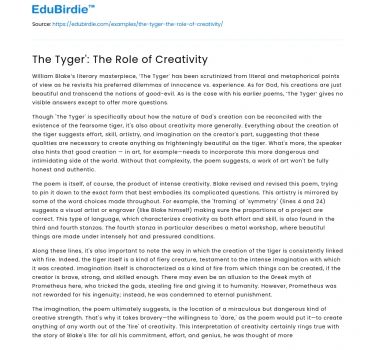William Blake’s literary masterpiece, ‘The Tyger’ has been scrutinized from literal and metaphorical points of view as he revisits his preferred dilemmas of innocence vs. experience. As for God, his creations are just beautiful and transcend the notions of good-evil. As is the case with his earlier poems, ‘The Tyger’ gives no visible answers except to offer more questions.
Though 'The Tyger' is specifically about how the nature of God's creation can be reconciled with the existence of the fearsome tiger, it's also about creativity more generally. Everything about the creation of the tiger suggests effort, skill, artistry, and imagination on the creator's part, suggesting that these qualities are necessary to create anything as frighteningly beautiful as the tiger. What's more, the speaker also hints that good creation — in art, for example—needs to incorporate this more dangerous and intimidating side of the world. Without that complexity, the poem suggests, a work of art won't be fully honest and authentic.
Save your time!
We can take care of your essay
- Proper editing and formatting
- Free revision, title page, and bibliography
- Flexible prices and money-back guarantee
The poem is itself, of course, the product of intense creativity. Blake revised and revised this poem, trying to pin it down to the exact form that best embodies its complicated questions. This artistry is mirrored by some of the word choices made throughout. For example, the 'framing' of 'symmetry' (lines 4 and 24) suggests a visual artist or engraver (like Blake himself) making sure the proportions of a project are correct. This type of language, which characterizes creativity as both effort and skill, is also found in the third and fourth stanzas. The fourth stanza in particular describes a metal workshop, where beautiful things are made under intensely hot and pressured conditions.
Along these lines, it's also important to note the way in which the creation of the tiger is consistently linked with fire. Indeed, the tiger itself is a kind of fiery creature, testament to the intense imagination with which it was created. Imagination itself is characterized as a kind of fire from which things can be created, if the creator is brave, strong, and skilled enough. There may even be an allusion to the Greek myth of Prometheus here, who tricked the gods, stealing fire and giving it to humanity. However, Prometheus was not rewarded for his ingenuity; instead, he was condemned to eternal punishment.
The imagination, the poem ultimately suggests, is the location of a miraculous but dangerous kind of creative strength. That's why it takes bravery—the willingness to 'dare,' as the poem would put it—to create anything of any worth out of the 'fire' of creativity. This interpretation of creativity certainly rings true with the story of Blake's life: for all his commitment, effort, and genius, he was thought of more as a madman than a visionary during his lifetime.






 Stuck on your essay?
Stuck on your essay?

